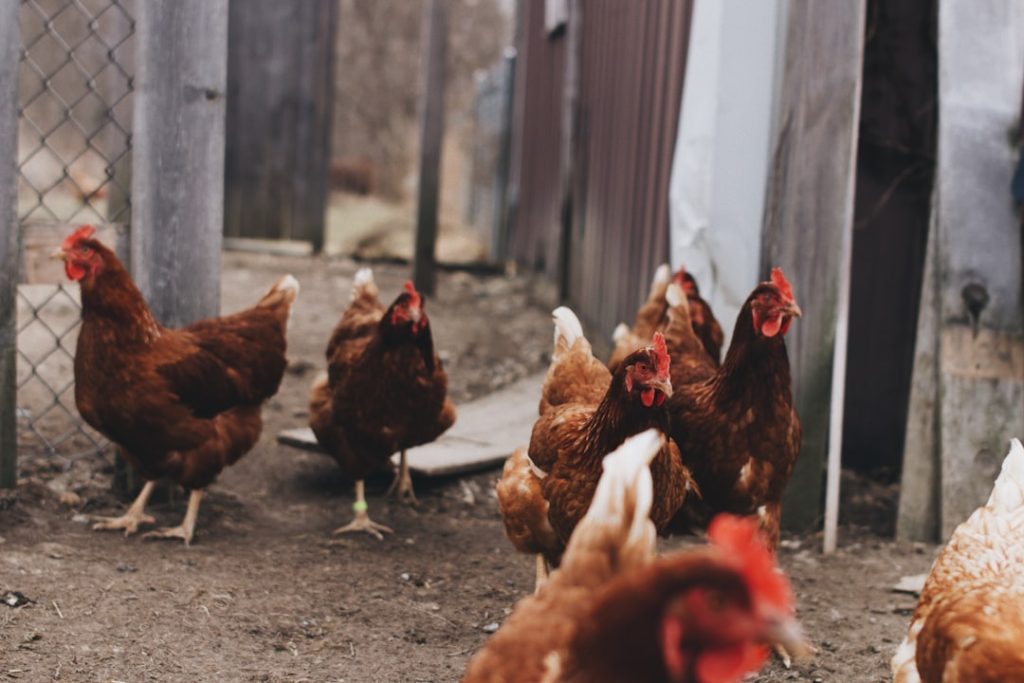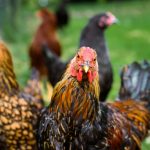Mix breeding chickens, also known as crossbreeding, involves mating chickens of different breeds to produce offspring with desirable traits from both parent breeds. This practice offers several advantages, including enhanced genetic diversity, improved disease resistance, and the potential for hybrid vigor. Increased genetic diversity is a significant benefit of mix breeding chickens.
By introducing new genetic material into a flock, farmers can reduce the risk of inbreeding and its associated health problems. This diversity helps maintain a healthy and robust chicken population. Mix breeding can also lead to improved disease resistance in chickens.
Offspring from different breeds may inherit a broader range of immune system genes, potentially making them less susceptible to certain diseases. This can be particularly advantageous in areas where specific diseases are prevalent, as mix-bred chickens may have a better chance of survival and thriving in such environments. Another benefit of mix breeding is the potential for hybrid vigor, also known as heterosis.
This phenomenon occurs when the offspring of two different breeds exhibit traits that are superior to those of either parent breed. Hybrid vigor can result in chickens with improved productivity, better growth rates, and increased resilience to environmental stressors. Overall, mix breeding chickens can offer a range of benefits that contribute to the health and productivity of a poultry flock.
Table of Contents
Key Takeaways
- Mix breeding chickens can result in healthier and more resilient birds
- Choosing the right breeds for mix breeding is crucial for success
- Providing proper care and nutrition is essential for successful mix breeding
- Regular health checks and vaccinations are important for managing the wellness of mix breed chickens
- Potential challenges of mix breeding include unpredictable traits and behaviors in the offspring
Choosing the Right Breeds for Mix Breeding
Identifying Desired Traits
Firstly, it’s important to consider the specific traits you want to enhance in the offspring. For example, if you are looking to improve egg production, you may want to choose parent breeds known for their high egg-laying abilities. Similarly, if you are aiming for meat production, you would select parent breeds with desirable meat qualities. By identifying the traits you want to enhance, you can narrow down your options and choose breeds that are best suited to your goals.
Ensuring Compatibility
Secondly, it’s essential to consider the compatibility of the parent breeds. Some breeds may not be compatible for mix breeding due to genetic differences or potential health issues in the offspring. It’s important to research the parent breeds thoroughly and consult with experienced breeders to ensure that the chosen breeds are compatible for mix breeding.
Considering the Intended Purpose
Lastly, the intended purpose of the offspring should also be taken into account when choosing breeds for mix breeding. Whether you are looking for dual-purpose chickens that excel in both egg and meat production or specialized breeds for specific purposes, such as ornamental or rare breed preservation, it’s important to select parent breeds that align with your goals for the offspring.
Overall, choosing the right breeds for mix breeding requires careful consideration of the desired traits, compatibility of parent breeds, and the intended purpose of the offspring.
Tips for Successful Mix Breeding

Successfully mix breeding chickens requires careful planning and attention to detail. There are several tips that can help poultry farmers achieve successful mix breeding and produce offspring with desirable traits. Firstly, it’s important to start with healthy and high-quality parent stock.
The health and genetic quality of the parent breeds will greatly influence the health and traits of the offspring. Selecting healthy and well-bred parent stock is essential for producing strong and resilient mix bred chickens. Secondly, it’s crucial to have a clear breeding plan in place.
This includes identifying the specific traits you want to enhance in the offspring, selecting compatible parent breeds, and establishing a breeding program that aligns with your goals. A well-thought-out breeding plan can help ensure that the mix breeding process is focused and purposeful. Additionally, proper record-keeping is essential for successful mix breeding.
Keeping detailed records of the parent stock, breeding pairs, and offspring will help track the progress of the mix breeding program and identify any trends or patterns in the traits of the offspring. This information can be valuable for making informed breeding decisions in the future. Furthermore, it’s important to monitor the health and development of the offspring closely.
Regular health checks and observations can help identify any potential issues early on and ensure that the mix bred chickens are growing and developing as expected. Overall, successful mix breeding requires careful selection of parent stock, a clear breeding plan, thorough record-keeping, and diligent monitoring of the offspring’s health and development.
Managing the Health and Wellness of Mix Breed Chickens
Managing the health and wellness of mix breed chickens is essential for ensuring their long-term productivity and well-being. There are several key aspects to consider when it comes to maintaining the health of mix breed chickens, including proper nutrition, disease prevention, and regular veterinary care. Firstly, providing a balanced and nutritious diet is crucial for supporting the health and productivity of mix breed chickens.
A diet that meets their nutritional needs will help ensure that they have the energy and nutrients required for growth, egg production, and overall health. It’s important to provide a diet that is appropriate for their age, purpose (e.g., egg-laying or meat production), and any specific nutritional requirements based on their breed or genetic background. Secondly, disease prevention is an important aspect of managing the health of mix breed chickens.
This includes implementing biosecurity measures to prevent the introduction and spread of diseases within the flock, as well as vaccination programs where appropriate. Regular cleaning and disinfection of coops and equipment, as well as monitoring for signs of illness in the flock, can help minimize the risk of disease outbreaks. In addition to nutrition and disease prevention, regular veterinary care is essential for managing the health of mix breed chickens.
Routine check-ups with a poultry veterinarian can help identify any health issues early on and provide guidance on preventative care measures. Veterinary care is particularly important for addressing any specific health concerns that may arise due to the genetic diversity of mix breed chickens. Overall, managing the health and wellness of mix breed chickens requires providing a balanced diet, implementing disease prevention measures, and seeking regular veterinary care to ensure their long-term health and productivity.
Potential Challenges of Mix Breeding Chickens
While there are many benefits to mix breeding chickens, there are also potential challenges that poultry farmers may encounter when implementing a mix breeding program. It’s important to be aware of these challenges in order to address them effectively and maximize the success of mix breeding efforts. One potential challenge of mix breeding chickens is managing genetic diversity effectively.
While genetic diversity is important for maintaining a healthy population of chickens, it can also present challenges in terms of maintaining breed standards and preserving specific traits within a flock. Poultry farmers must carefully manage genetic diversity to avoid diluting desirable traits or introducing unwanted characteristics into their flocks. Another challenge of mix breeding chickens is ensuring compatibility between parent breeds.
Not all breeds are compatible for mix breeding, and some combinations may result in offspring with undesirable traits or health issues. It’s important to research and consult with experienced breeders to ensure that chosen parent breeds are compatible and have complementary traits that will result in desirable offspring. In addition, managing hybrid vigor can be a challenge when mix breeding chickens.
While hybrid vigor can result in offspring with superior traits, it can also be difficult to predict which specific traits will be enhanced in the offspring. Poultry farmers must carefully select parent breeds and monitor the traits of the offspring closely to ensure that hybrid vigor results in desirable outcomes. Overall, potential challenges of mix breeding chickens include managing genetic diversity effectively, ensuring compatibility between parent breeds, and managing hybrid vigor to achieve desirable traits in the offspring.
The Importance of Genetic Diversity in Mix Breeding

The Risk of Inbreeding Depression
Inbreeding depression occurs when closely related individuals are bred together, leading to an increased likelihood of genetic disorders and reduced fitness in the offspring. By introducing genetic diversity through mix breeding, poultry farmers can help mitigate the risk of inbreeding depression and maintain a healthy population of chickens.
Increased Disease Resistance
Genetic diversity can also contribute to increased disease resistance within a flock. When chickens have a wider range of immune system genes due to genetic diversity, they may be less susceptible to certain diseases. This can be particularly beneficial in environments where specific diseases are prevalent, as genetically diverse chickens may have a better chance of surviving and thriving in such conditions.
Improved Adaptability and Overall Fitness
In addition to reducing the risk of inbreeding depression and improving disease resistance, genetic diversity can also contribute to overall population fitness by increasing adaptability to changing environmental conditions. A genetically diverse population is more likely to have individuals with a range of traits that may be advantageous in different environments or under varying stressors. Overall, genetic diversity plays a critical role in maintaining healthy and resilient poultry populations through mix breeding by reducing the risk of inbreeding depression, improving disease resistance, and increasing adaptability to changing environmental conditions.
The Future of Mix Breeding in Poultry Farming
The future of mix breeding in poultry farming holds great potential for improving the health and productivity of chicken populations worldwide. As poultry farmers continue to recognize the benefits of mix breeding, there is growing interest in developing new crossbred varieties with enhanced traits that meet specific market demands. One aspect of the future of mix breeding in poultry farming is its potential contribution to sustainable agriculture.
By creating crossbred varieties with improved disease resistance, productivity, or adaptability to specific environmental conditions, poultry farmers can reduce their reliance on antibiotics or other interventions while maintaining healthy chicken populations. Furthermore, mix breeding offers opportunities for developing specialized crossbred varieties tailored to meet specific market demands. For example, there is increasing interest in developing crossbred varieties with enhanced meat quality or unique appearance traits that appeal to consumers.
By leveraging mix breeding techniques, poultry farmers can create new crossbred varieties that offer unique selling points in competitive markets. In addition to its potential contributions to sustainable agriculture and market-driven innovation, mix breeding also holds promise for preserving rare or endangered chicken breeds. By incorporating genetics from rare or endangered breeds into crossbred varieties, poultry farmers can help maintain genetic diversity within chicken populations while also promoting conservation efforts for these valuable genetic resources.
Overall, the future of mix breeding in poultry farming is bright as it continues to offer opportunities for sustainable agriculture, market-driven innovation, and conservation efforts for rare or endangered chicken breeds. As poultry farmers continue to explore new crossbred varieties with enhanced traits through mix breeding techniques, there is great potential for improving the health and productivity of chicken populations worldwide.
If you’re interested in learning more about large chicken coop ideas, be sure to check out this article on Poultry Wizard. It provides valuable information on creating a spacious and comfortable living environment for your mixed breed chickens.
FAQs
What is mix breeding in chickens?
Mix breeding in chickens refers to the practice of breeding two different chicken breeds to create a new hybrid breed with specific desired traits. This can involve crossing different breeds for improved egg production, meat quality, or other characteristics.
What are the benefits of mix breeding chickens?
Mix breeding chickens can result in offspring that exhibit the desirable traits of both parent breeds, such as increased disease resistance, better egg-laying ability, or improved meat quality. It can also lead to hybrid vigor, where the offspring are healthier and more robust than the parent breeds.
What are some popular mix breeds of chickens?
Some popular mix breeds of chickens include the Black Sex Link, Red Sex Link, and Olive Egger. These hybrids are created by crossing specific parent breeds to achieve desired traits such as egg color, production, or meat quality.
How do you mix breed chickens?
To mix breed chickens, you would select specific parent breeds with the desired traits and then cross them to produce hybrid offspring. This can be done through natural mating or artificial insemination, depending on the specific breeding goals.
Are there any drawbacks to mix breeding chickens?
While mix breeding chickens can result in desirable traits, there can also be challenges such as inconsistent offspring characteristics, difficulty in maintaining specific breed standards, and potential health issues in the hybrid offspring. It’s important to carefully consider the goals and potential challenges of mix breeding before undertaking the process.
Meet Walter, the feathered-friend fanatic of Florida! Nestled in the sunshine state, Walter struts through life with his feathered companions, clucking his way to happiness. With a coop that’s fancier than a five-star hotel, he’s the Don Juan of the chicken world. When he’s not teaching his hens to do the cha-cha, you’ll find him in a heated debate with his prized rooster, Sir Clucks-a-Lot. Walter’s poultry passion is no yolk; he’s the sunny-side-up guy you never knew you needed in your flock of friends!







